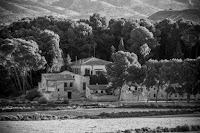History evenings

I went to a little bilingual talk last night about the history of the nearby village of La Romana. It wasn't at all bad. The local expert, Francesc Gallardo, did his stuff and answered, knowledgeably, the questions he was asked. He was ably assisted by a woman, Anabel, who handled the translation. She was the same woman who did the talk back in December . I had no real trouble understanding nearly all of the Spanish part of the talk and my English was up to the English part though that didn't seem to be everyone's case. I'm not talking about the Spanish; I'm talking about the English. I thought we had some most amusing culture and translation problems. In the Q&A session someone asked in English about a building that had a "big flat stone" inside, "probably" for processing grapes. The translator turned the English into Spanish and talked about grapes and wine to the Francesc, the speaker. He said he didn't know of any bodegas (winer...
